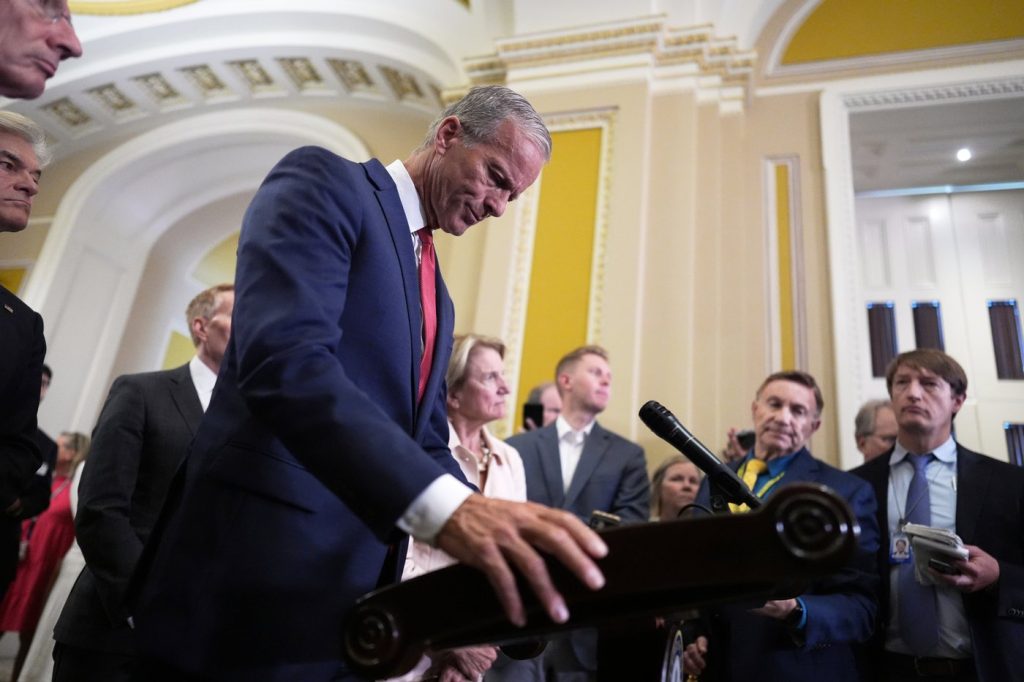WASHINGTON — House and Senate Republicans are diverging in their approaches to tax cuts as they work on a substantial tax and spending cuts bill. The two chambers are at odds regarding the deduction size for state and local taxes, as well as various provisions like allowing health savings accounts to cover gym memberships and imposing annual fees on electric vehicle (EV) and hybrid owners.
The House passed its version of the bill just before Memorial Day, with the Senate now looking to forward its own version. Despite similarities in major tax provisions, the reconciliation of their differences will play a crucial role in determining how swiftly they can finalize legislation. President Donald Trump has expressed a desire to have the bill on his desk by July 4th.
One key aspect of the proposed legislation is the child tax credit. Currently, this credit is set at $2,000 per child. The House bill aims to temporarily increase this credit to $2,500 for the 2025 through 2028 tax years and to index the credit amount for inflation starting in 2027. In contrast, the Senate bill proposes an initial increase to $2,200, which would be permanent, with indexing to inflation beginning next year.
In line with Trump’s campaign promises to eliminate income taxes on tips, overtime, and Social Security benefits, both bills incorporate temporary deductions from 2025 to 2028, albeit with differences. The House bill allows for a deduction on tips for workers in traditionally tipped roles and offers a deduction for overtime equivalent to the amount earned. Conversely, the Senate bill imposes restrictions, limiting the tip deduction to $25,000 per taxpayer and the overtime deduction to $12,500 per taxpayer. Additionally, both versions propose a deduction of up to $10,000 for interest on auto loans for vehicles manufactured in the United States and introduce larger tax deductions for Americans aged 65 and older, with the House setting it at $4,000 and the Senate at $6,000.
Another point of contention is the state and local tax (SALT) deduction. Presently capped at $10,000, the House bill seeks to raise this cap to $40,000 for households earning less than $500,000, phasing down for higher earners. In stark contrast, the Senate bill retains the existing cap, which poses a significant obstacle in negotiations as House Republicans are unlikely to accept it.
The provisions concerning Medicaid also highlight differing perspectives; the House bill restricts states from imposing new provider taxes, impacting Medicaid funding. These taxes are essential for states to secure increased federal matching funds while maintaining reimbursements for providers. On the other hand, the Senate bill proposes a gradual reduction of the current tax cap from 6% to 3.5% by 2031 for states that have extended Medicaid under the Affordable Care Act. Critics, including Senator Josh Hawley, have raised concerns that the Senate's approach could jeopardize rural hospitals and lead to Medicaid program cuts.
The approaches to business tax breaks are also distinct. The House version would allow full deductions for equipment and domestic research and development expenses for five years, while the Senate’s bill proposes making these tax breaks permanent, favoring powerful trade groups like the U.S. Chamber of Commerce.
In terms of clean energy tax credits, both chambers aim to scale back provisions established through Biden’s climate law. The Senate bill proposes a slower phase-out of clean energy and home efficiency tax credits compared to the House version, raising concerns that job losses in this sector could be significant, affecting household energy costs.
Other notable differences include the House's allowance for using health savings accounts for gym memberships, with caps set at $500 for singles and $1,000 for joint filers, a provision absent in the Senate bill. Furthermore, the House introduces a charitable deduction for non-itemizers capped at $150 per taxpayer, while the Senate increases it to $1,000. Additionally, the House includes a new annual fee for EV owners set at $250 and $100 for hybrid owners, which the Senate does not adopt.











